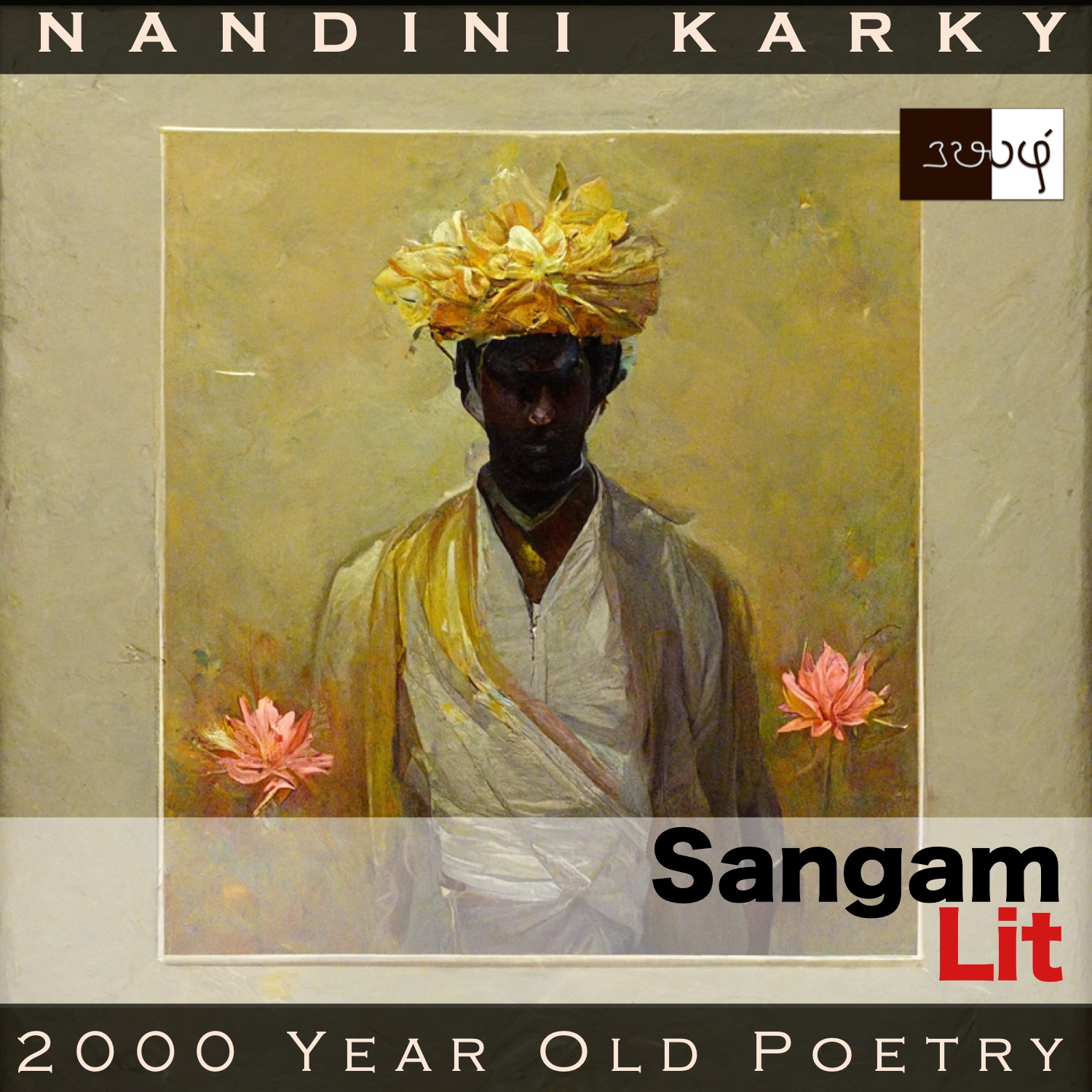Podcast: Play in new window | Download
Subscribe: Apple Podcasts | Spotify | Amazon Music | Android | iHeartRadio | TuneIn | RSS | More
In this episode, we listen to the valour and generosity of a king, as depicted in Sangam Literary work, Puranaanooru 69, penned about the Chozha King Kulamutrathu Thunjiya Killivalavan by the poet Aalathoor Kizhaar. Set in the category of ‘Paadaan Thinai’ or ‘King’s praise’, the verse promises good tidings to a poor bard, who has nowhere to turn.

கையது, கடன் நிறை யாழே; மெய்யது,
புரவலர் இன்மையின் பசியே; அரையது,
வேற்று இழை நுழைந்த வேர் நனை சிதாஅர்
ஓம்பி உடுத்த உயவல் பாண!
பூட்கை இல்லோன் யாக்கை போலப்
பெரும் புல்லென்ற இரும் பேர் ஒக்கலை;
வையகம் முழுதுடன் வளைஇ, பையென
என்னை வினவுதி ஆயின், மன்னர்
அடு களிறு உயவும் கொடி கொள் பாசறை,
குருதிப் பரப்பின் கோட்டு மா தொலைச்சி,
புலாக் களம் செய்த கலாஅத் தானையன்
பிறங்கு நிலை மாடத்து உறந்தையோனே;
பொருநர்க்கு ஓக்கிய வேலன், ஒரு நிலைப்
பகைப் புலம் படர்தலும் உரியன்; தகைத் தார்
ஒள் எரி புரையும் உரு கெழு பசும் பூண்
கிள்ளி வளவற் படர்குவை ஆயின்,
நெடுங் கடை நிற்றலும் இலையே; கடும் பகல்
தேர் வீசு இருக்கை ஆர நோக்கி,
நீ அவற் கண்ட பின்றை, பூவின்
ஆடு வண்டு இமிராத் தாமரை
சூடாயாதல் அதனினும் இலையே.
A rather long verse describing the state of an impoverished bard and the path to his redemption. The poet’s words can be translated as follows:
“Upon your hands, is a well-tuned lute; In your body, hunger owing to the lack of patrons; Around your waist, a cloth patched up with many unmatched threads, soaked in sweat. You wear all this with much care, O sad bard!
Like the body of a person who has no purpose, is your huge crowd of kith and kin, with much suffering; After circling all around the land, you ask me slowly what to do. I will tell you about him, who has the strength to kill elephants of enemy kings on that flag-fluttering battlefield. His army makes those tuskers lie in blood, making that battle ground, a field of flesh. He is the ruler of Uranthai, who resides in glowing mansions. He is one who raises his flashing swords against enemies; He never hesitates to venture into enemy lands to claim them; With glowing garlands and burning spears, he has a striking form, the gold-clad Killivalavan. If you were to go to him, you do not have to wait for long at his gates; Even at the harsh hour of noon, he will be showering chariots upon his supplicants. Once you have taken in that sight of him, you are sure to wear a lotus, around which no bee shall buzz around.”
Let us delve into the nuances of this verse. The poet starts by describing the bard, to whom he’s addressing these words. He talks about the excellent lute the bard carries. But that seems to be the only excellent thing about this bard for he is then talked about as having hunger in his body and wearing patched-up, sweaty clothes. From the bard’s unkempt appearance, the poet turns to talk about how this poor bard who cannot even feed himself has a huge family to support, and for that, the poet brings in a deeply philosophical simile of the body of a person without any purpose. Herein lies the inference, that to be blessed with this body implies that one should have a purpose in life.
Moving on, the poet comes to the crux of the situation, which is the bard’s question of what to do, now that he seems to have no one to solve his troubles. Then, the poet starts talking about this fearsome king, who has no qualms about killing enemy elephants in the battlefield and turning that place into a blood-soaked field of flesh. After those gruesome details, the poet declares that the person described so is the ruler of Uranthai, and talks about his flaming weapons and striking form. He tells the bard if only the bard were to go to where the king lives, there won’t be any waiting to see the king, for all day, even under the harsh noon sun, the royal would be showering chariots upon supplicants in his land. The poet concludes with the words that the moment the bard has seen this, he is sure to return with a lotus that no bee shall touch, implying that it’s a golden lotus, a gift of great value to bards in that day. Yet another song, in which an experienced poet points his protege in the direction of a patron, who would transform an impoverished life into one of prosperity!




Share your thoughts...